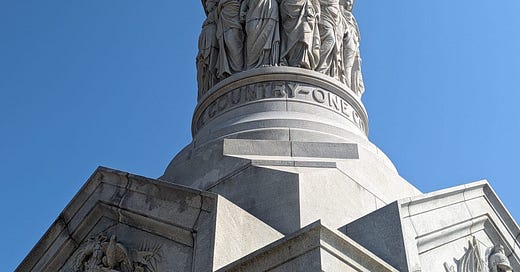A tale of two countries:
United States:
When the founding fathers debated and signed the Declaration of Independence on July 4th, 1776, there was no territory with them, which became the stepping stone to creating a country. In 1778, delegates of King Louis XVI and those of the Continental Congress signed an agreement for France's armed assistance to the United States to liberate the country.
When the seven-year war fought by joint armies concluded in 1781 under General George Washington and French General Comte De Rochambeau, the British Army had to surrender and leave the United States. A country was now in existence as no more British were on the mainland.
India:
On October 21st, 1943, a few weeks after assuming the presidentship of Indian Independence leagues that existed in practically all major towns in Japan, Malaya, Hong Kong, China, Thailand, and Burma, Subhas Bose fearlessly declared a Provisional Government of Free India in Singapore.
He had secured an agreement with Imperial Japan to help him fight against the British for liberating India.
Bose believed all people of Indian origin living in these formerly British territories or other places to be citizens of his Government and asked them to sign a letter of pledge to the new Provisional Government and support it financially.
Over 330,000 people, united in their desire for freedom, signed this pledge and supported this Government financially. Nine countries soon recognized this Government, which had its own currency, bank, and postage stamps, among other infrastructure supports.
When Bose declared war on the British Empire through his Government's armed wing, the Indian National Army, they started the monumental task of liberating India. On April 14th, 1944, they were able to fly the flag of the Provisional Government in mainland India for the first time. An official of Bose's Government managed the liberated territory.
The flag had earlier been flown at Port Blair by Bose on December 30th, 1943, at the capital of the Andaman Islands, which had been occupied by the Japanese from the British earlier and were handed over to the Provisional Government of India.
Was Subhas Bose inspired to take the same route for India?
Relentless bombing for three months, absence of Air support from the Japanese due to their heavy losses on the Pacific front, disease, and battlefront casualties caused 26000 of the 50,000-strong army to lose lives.
Brought to India, some of the officers were tried for treason. The court martial found them guilty, and they were to be punished by life imprisonment and loss of all earlier salaries and benefits.
The country had become so agitated by this trial that city after city had strikes. The support of the Indian army and police for British rule became doubtful, and the Navy and air force rebelled.
The British. They decided to leave India and hand over power in a way that could meet their economic goals.
When Narendra Modi, the present Prime Minister of India, inaugurated on September 8th, 2022, a massive 28 feet granite statue of Subhas Chandra Bose carved from a single piece of stone in a canopy which previously had a statue of George V th till 1968 and had been empty since. Modi called Bose ‘The First Prime Minister of Undivided India.' Bose is in a military dress, which he had started wearing as Supreme Commander of the Indian National Army.
Update on Indian Elections:
On May 7th, the third voting phase was over, which meant that out of 543 seats, the fate of 283 seats was sealed in Electronic Voting Machines. The number of votes cast, time voting closed, etc., are signed by representatives of each contestant, and the seal is put in their presence. About 67% of voters have exercised their franchise so far in the areas where voting has taken place.
The fourth phase is on Monday, June 13th, and the last phase is on June 1st. Counting will start on June 4th morning, and by the time the United States has a morning, the results will be known.
The leader of the party that gets a majority will be the Prime Minister of India for the next five years. Many are considering this election a civilizational battle between two opposing parties with different economic and social policies that will decide the fate of the country.
Historical Event of the fortnight:
1. Winston Churchill took over as British PM, with Chamberlain stepping down in 1940.He resolved to fight Germany instead of appeasement.
2. Germany surrendered on May 7th, 1945, in World War two.




Thanks so much !
Very interesting read, sir!